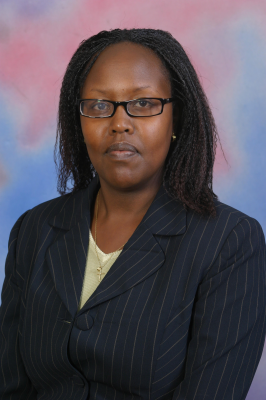A Kenyan perspective on Covid-19 and the future

Rosaline Serem
As a native Kenyan with a local perspective and professional business experience, I believe that more than ever the vulnerable populations in Eastern Africa will need the help of the Shalom Center for Conflict Resolution and Reconciliation to combat the deeply pervasive impacts from the Covid-19 pandemic.
Beyond the current health crisis, the far-reaching ramifications will be both human and economic, intermingling in a downward spiral. In Africa, the pandemic is already disrupting millions of people's livelihoods with disproportionate suffering among poor households and small, informal business. Experts expect this to accelerate, and this could undermine the peace and security of the country and the region.
I believe the potential risks in Eastern Africa during and after the viral pandemic are:
Health impact: Medical institutions in Kenya do not have enough physicians, equipment, bed capacity, protective gear or medical supplies to handle expected case levels. A large number of Kenyans have underlying conditions - like HIV, tuberculosis, measles, malaria and more - that could lead to higher death rates among the population.
Unemployment and hunger: With devastating job losses and the closure of small-to-mid-size enterprises, millions of people will be unable to sustain basic human needs. Malnutrition and starvation could become widespread, particularly in the conflict zones where Shalom operates.
Delayed economic recovery: Kenya's economic recovery to pre-virus levels may take 18 to 24 months from the time county and national borders are re-opened. It could take even longer according to history-based models - Kenya's next national elections are in August 2022 and typically the economy takes a downturn a year beforehand.
Domestic violence: Sexual abuse and exploitation, as well as domestic violence, are already an issue for women and children, and could become worse.
Social unrest: Civil disorder is sadly inevitable among informal/slum dwellers due to food shortages and price hikes, and the possible famine from a large locust invasion could exacerbate the situation. Protests and clashes may overload law and order systems and structures.
Crime: With economic pressure and increasing desperation, crime will probably escalate.
Education: In poor communities, a majority of children do not have access to computers and internet connectivity in order to continue curriculum online necessitated by school closures. Many poor families, especially in the zones Shalom operates in, may not be able to afford to send their children to school and will need all the help they can access.
Mental Health: Psychological trauma will affect many. Unfortunately, there is poor access to mental health services for the vast majority of the population.
Discrimination: There is a danger of stereotyping of foreigners, particularly Chinese nationals, who many blame as the infection source.
Implications and challenges for Shalom-SCCRR
Shalom's work in conflict inter-ethnic border regions
In the marginalized inter-ethnic conflict zones of Northern Kenya bordering Uganda, South Sudan, Ethiopia and Somalia, this viral adversary will undoubtedly compound Shalom's risks and challenges in working with warring factions on conflict transformation. Resource scarcity can breed competition, as well as stigmatization, stereotyping, confrontation and tension. These factors will demand astute monitoring and interventions to ensure the stability of Shalom's previously achieved peacebuilding milestones.
Shalom's work in Nairobi slums
Somewhat similarly in Nairobi's vast slums, populated by approximately 2 million people making it one of the largest in the world, Shalom will have to factor the virus interventions and implications into its methodology for addressing inter-ethnic conflict, religious fundamentalism-extremism and violence. These serious issues could possibly increase security dangers for Shalom's modus operandi while implementing on-site interventions.
Shalom's leadership and advisory role
More than ever, there will be an increased need for proven expertise in intervention and facilitation skills to remediate and transform competition for resources to meet human needs, violence, conflict, religious ideological extremism and inter-ethnic tensions, as they build on each other exponentially. And there will be a greater need for inspirational leadership and strategic advice from an organization like Shalom that has achieved the extraordinary respect of local leaders, government officials and other NGOs working among vulnerable groups. International support from all the Shalom units in the USA, UK, Ireland and around the world will be needed now more than ever. Africa needs you all.
Shalom is in a unique position to aid the Kenyan people because of their proven conflict resolution methodology, their earned respect across sectors of the Eastern African region, and their network of influential spokespeople who have been trained in the Shalom peace transformation philosophy and process. The Shalom team has the experience, the commitment to this work, and the resolve to ensure their efforts make a lasting impact.
My hope is that governmental bodies, the business sector, development institutions and charitable organizations, together with the ever present interventions of Shalom, will expand efforts to enhance health delivery, protect all citizens equally, safeguard livelihoods, bolster the economy and ensure peace across Eastern Africa.
I speak to you as part of a shared humanity who cares about you, too, and ask you to shoulder the burden with us in this time of great need. We will never forget you in our prayers and in our solidarity with your families as we overcome these challenges together. Be blessed.
(Rosaline Serem is a businesswoman and social entrepreneur in Nairobi, and is a Board Member of the Shalom Center for Conflict Resolution and Reconciliation which was established in 2009 by Irish missionary, Fr Patrick Devine SMA)


















